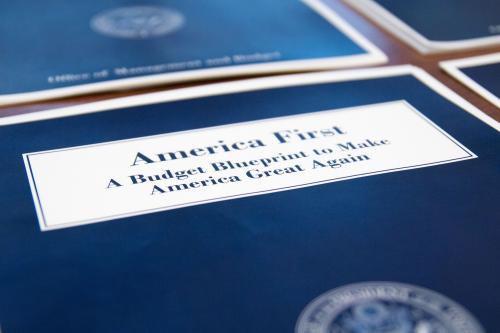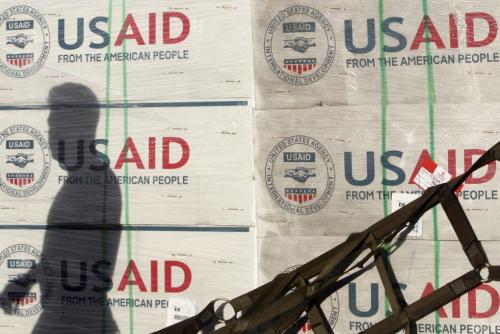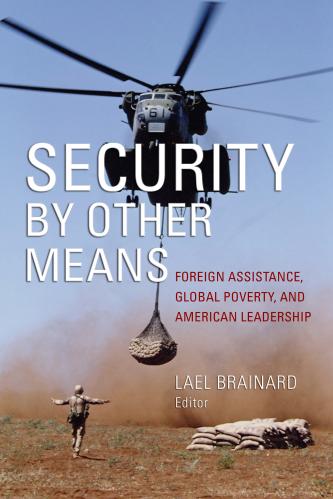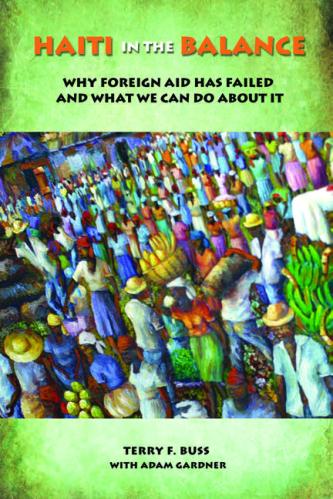From August 2-4, the Global Economy and Development Program at Brookings will host the 14th Annual Brookings Blum Roundtable, “U.S. Foreign Assistance Under Challenge.” The following is one of six briefs on topics to be highlighted at the roundtable.
In 2011, as the annual budget resolution hit the Senate floor, multiple amendments were offered to cut the foreign assistance account. Senator Rand Paul of Kentucky offered the most dangerous amendment to cut billions from the International Affairs Budget. While it was defeated, it still garnered 20 votes. In the intervening years, Senator Paul offered similar amendments—but his final effort in 2015 was different. It was soundly defeated by a 96-4 vote.
What happened in between—and ultimately over the past two decades—is part of an important storyline of the politics not just of foreign assistance, but of America’s global leadership.
Lessons from the Marshall Plan
Stories of U.S. foreign aid are rarely told without a mention of U.S. Secretary of State George Marshall, considered the father of foreign assistance with the Marshall Plan. Yet the political acumen of this retired general—who served as both secretary of state and secretary of defense—is often underappreciated.
As we recently marked the 70th anniversary of the plan’s announcement, few may remember that, despite its overwhelming success, the initial proposal was wildly unpopular and feverishly opposed by the Senate Majority Leader Robert Taft of Ohio and a war-weary America seeking to benefit from the peace dividend.
Marshall and Secretary of Commerce Averell Harriman made it their personal mission to earn the public’s support. Without the benefit of social media, they traveled around the country for months, speaking to everyone from Rotary clubs to chambers of commerce about both the “nobleness” of the plan, but also why it was in America’s self-interest to rebuild a more stable Europe that would be a future market for American goods and a partner for peace.
Recognizing the uphill battle, the State Department even established a bipartisan citizen’s commission—comprised of prominent businessmen, industrialists, academics, ambassadors, and clergy—charged with embarking on a nationwide public relations campaign. While early Gallup polls showed that more than 50 percent of Americans opposed the program, the plan eventually passed overwhelmingly in Congress.
Not only was the Marshall Plan unpopular, it also suffered from two tough labels—namely “foreign” and “aid.” Yet with strong political leadership, an engaged cadre of credible messengers, and a clear message about how the policy impacted voters’ interests, the outcome was successful. Seventy years later, these political lessons still ring true.
The Cold War politics of foreign aid
During the Cold War, American support for robust engagement in the world held steady, with polls showing that a vast majority of Americans supported overseas programs like famine relief. Unfortunately, this was the same era when negative stereotypes arose—a reminder of past aid to authoritarian rulers who were nominally allies against the Soviet Union.
Interestingly, as the Cold War came to an end, it was President Ronald Reagan whose “peace through strength” foreign policy platform fostered strong support for foreign assistance among conservatives. While Reagan may be best known for his military buildup, he recognized that “the ultimate importance to the United States of our security and development assistance programs cannot be exaggerated.” Under his leadership in 1985, the U.S. spent close to 0.6 percent of the nation’s GDP on civilian international affairs programs—the high water mark for foreign assistance spending since the Marshall Plan.
The pre-9/11 era and the isolationist winds
By the mid-1990s, policymakers were eager to reap a “peace dividend” after the end of the Cold War. As isolationist winds were blowing through Washington, some members of Congress openly stood on the floor of the House of Representatives and bragged that they did not own a passport. And the House Budget Resolution for Fiscal Year 1996 called for cutting more than 20 percent from the foreign assistance account, then totaling only $20 billion.
In the Senate, Foreign Relations Committee Chairman Jesse Helms, a self-avowed aid skeptic, proposed a radical shrinking of America’s footprint around the world—including the elimination of the U.S. Agency for International Development. Between 1990 and 2000, foreign assistance spending declined by 20 percent, thousands of State Department and USAID positions were eliminated, and 70 USAID missions and diplomatic posts were shuttered. USAID was ultimately saved with the concession to eliminate the U.S. Information Agency.
The threats to foreign assistance and America’s global leadership during this time were a wake-up call. With the exception of the pro-Israel community, led by the American Israel Public Affairs Committee, there was no organized effort to educate, engage, and mobilize around foreign assistance on a national scale. While there were unique efforts on specific issues, no one had tried to engage the broad array of citizen voices who cared about America’s global engagement and could convey strong domestic support for global development and diplomacy. But soon this would change.
The political transformation of foreign aid
During these tumultuous years, several important efforts were born. Through the late 1990s, the faith-based community led the wildly successful Jubilee 2000 campaign to secure debt relief for developing countries. And in the mid-2000s, Bono launched the ONE Campaign, creating a worldwide grassroots movement that, along with dozens of nongovernmental organizations, has had a critical impact in galvanizing voices in support of poverty-focused development aid.
In 1995, a broad-based coalition of “strange bedfellows”—eventually known as the U.S. Global Leadership Coalition (USGLC)—took a page out of Secretary Marshall’s playbook and began to transform the politics of foreign aid. In the early years, the USGLC sought to counter the isolationist tides and stop the hemorrhaging of the international affairs account. Today, the USGLC works around the country building broad support for America’s global leadership, development, and diplomacy with a coalition of more than 500 businesses and NGOs; a bipartisan advisory council chaired by former Secretary of State Colin Powell that includes every living secretary of state; nearly 200 retired three- and four-star generals and admirals; and advocates in all 50 states.
While the community has weathered numerous efforts to scale back America’s civilian forces, the current proposals in Washington to slash the State Department and USAID by 32 percent present the most serious threat to America’s global leadership since the 1990s. And what many may not realize is that the historical and bipartisan groundswell of opposition that has unfolded over the past few months was actually years in the making.
Here are some of the lessons learned from two decades changing the politics of foreign aid:
1. Messengers matter
While many forceful voices have advocated for foreign assistance over the years, top generals and admirals have perhaps been the most powerful. These seemingly unexpected allies promoting the need for civilian power have been a game changer.
Years ago, General Anthony Zinni, a former Commander of the U.S. Central Command, helped launch a network of now nearly 200 three- and four-star military leaders with the likes of Generals David Petraeus and Michael Hagee, Admirals James Loy and James Stavridis, and many others. These battle-tested leaders have not only lent their names, but also testified to Congress, penned op-eds, and spoken out around the country. Their national security credibility has been unmatched.
Today, one of the most oft-cited quotes in support of our civilian forces is from then-General Jim Mattis who testified before the Senate Armed Services Committee in 2013: “If you don’t fund the State Department fully, then I need to buy more ammunition.”
2. Message matters
There is no silver bullet to ensure support from a policymaker, but what is clear is that members of Congress need the issue to be relevant back home. While lawmakers can believe that supporting America’s engagement overseas is the right thing to do, they also need the facts and figures to explain why it is the smart thing to do for our security and our economic interests.
On the frontlines of creating jobs and driving exports, the voices of business leaders and state chambers of commerce have been central to capturing the attention of lawmakers around the country. The economic message combined with a security and values-driven agenda has proven highly effective. A few samples of the three-pronged message:
- National security: “The military alone cannot keep us safe.”
- Jobs and the economy: “95 percent of consumers live outside the United States.”
- Moral leadership: “America is that shining city on the hill.”
3. Leadership matters
As Secretary Marshall and President Harry Truman demonstrated, leadership matters. Few have showed this better on development assistance than President George W. Bush. As a candidate who ran on a platform against “nation building,” he went on to be one of the greatest champions for global health, helping to save more than 13 million lives by launching PEPFAR (the President’s Emergency Plan for AIDS Relief) and the malaria relief program. His leadership in establishing the Millennium Challenge Corporation raised the bar for strengthening foreign assistance effectiveness.
The Obama administration built upon these successes, deepening our investments in public- private partnerships, aid effectiveness, and transparency, and ensuring country commitments through presidential initiatives on food security and energy. The nominated USAID administrator, Ambassador Mark Green, is well known for his leadership on smart aid reform.
Leadership on these issues also includes the legislative branch. In the past two and a half years, Congress passed eight significant pieces of bipartisan legislation on global development, ranging from food security to aid effectiveness to rights for women and girls, with sponsors from across the political spectrum.
4. Local voices matter
A junior member of Congress from the Midwest made a name for himself on local talk radio prior to being elected with the common refrain: “Why should we be building schools over there, when we should be building schools here at home?” Yet after this Tea Party conservative visited a USAID agriculture program in Africa, he became a staunch believer and vocal advocate for the foreign assistance budget.
The congressman’s decision to go on this overseas education trip did not come from his staff, but instead from a top CEO from his state. As House Speaker Tip O’Neill once said, “All politics is local.”
In the past decade, the most consequential and lasting shifts in policymakers’ support for foreign assistance has come as the groundwork spread far outside the beltway. In the last election cycle alone, nearly 200 candidates met with foreign assistance advocates—groups of local business, faith, NGO, veteran, and community leaders—in their home districts. These meetings, led by highly influential supporters of foreign assistance, have been critical in both educating skeptics and reinforcing champions, showcasing the strength of constituent support for global development.
5. Local platforms matter
Members of Congress not only need to hear this support, but they also need to feel it tangibly. A decade ago, the USGLC launched what has become a signature program—local statewide events that provide a platform for lawmakers to engage directly with their constituents on how America’s role in the world directly impacts their communities.
Several years ago, the USGLC hosted an event for a newly elected senator in his home state. The room was packed with hundreds of his constituents. Just before he was introduced, the senator leaned over to me and said, “My constituents don’t like foreign assistance.”
Once on stage, sandwiched between a prominent retired four-star general and a well-respected former diplomat, the senator found a different voice. With the political cover to his left and right, he started singing off of our song sheet, boldly telling the supportive crowd why aid was directly in America’s national security, economic, and humanitarian interests.
Time and again, these local programs have provided an opportunity for policymakers to speak out and the words spoken outside the beltway have translated into positives votes and action back in Washington. While isolationist winds may have returned to Washington in recent days, there are very different speeches being made on the House floor compared with two decades ago. In fact, more than 200 members of Congress from the Freedom Caucus to the Progressive Caucus have gone on the record opposing the proposal to cut the State Department and USAID by a third.
There is no shortage of political challenges in the coming months and years. In addition to the proposed cuts, polls taken year after year still underscore the misinformation about the size of the small 1 percent of the federal budget that is dedicated to foreign assistance. Most surveys suggest that Americans believe aid accounts for more than a quarter of the federal budget, and polling in the Heartland showed deeper concerns just last year.
But what has changed is that the many voices in our society who understand the stakes of America’s global leadership and the value of foreign assistance are speaking up—educating, engaging, and mobilizing. Members of Congress are not naïve—they see the complexities of the world, from threats of pandemics to famine to terrorism. Yet sometimes they also need a political embrace and a “thank you” for their leadership. And it is clear that today there is a growing chorus of voices doing just that.
The Brookings Institution is a nonprofit organization devoted to independent research and policy solutions. Its mission is to conduct high-quality, independent research and, based on that research, to provide innovative, practical recommendations for policymakers and the public. The conclusions and recommendations of any Brookings publication are solely those of its author(s), and do not reflect the views of the Institution, its management, or its other scholars.
Brookings gratefully acknowledges Richard C. Blum and the Rockefeller Foundation for their generous support of the 2017 Brookings Blum Roundtable.
Brookings recognizes that the value it provides is in its absolute commitment to quality, independence, and impact. Activities supported by its donors reflect this commitment.
The Brookings Institution is committed to quality, independence, and impact.
We are supported by a diverse array of funders. In line with our values and policies, each Brookings publication represents the sole views of its author(s).










